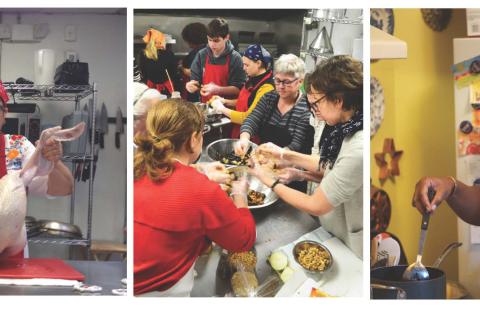What were the specific goals of this creative economy project? Describe the community development challenge or opportunity that your project was designed to address:
The goals of Nibble are:
- offer inclusive cultural programming
-foster cultural interchange through rich and experiential programming
-promote cultural tourism
-create task force development
-cultivate and protect Somerville's immigrant community in the face of increasing gentrification
-end goal #1: creation of a restaurant in Union Square area with rotation chefs that graduate from our Nibble entrepreneurship program
-end goal #2: creation of a Union Square food emporium that offers one over-arching space for immigrant-run food markets and a kitchen space for food demos and cooking classes
If the goals change over time, please describe how:
Since we began our ArtsUnion project (Nibble is just one component of this much larger cultural economic initiative), the square has changed considerably. Upscale restaurants have moved into Union Square and are thriving; and residential real estate has skyrocketed. Now the key goals are: 1) how to continue to generate foot traffic for ethnic restaurants and retail that still need support, and 2) how to protect immigrants from getting priced out of the area by supporting existing businesses and creating new immigrant-run small culinary businesses.
Who was involved in this project and what did they do? (be sure to include the partners from outside of the creative sector and how local voices were included):
Key Nibble project partners include:
-Union Square markets and restaurants (markets featured on our market tours; restaurant owners have led cooking classes and are leading workshops in our culinary entrepreneurship program)
-Kitchen Inc., Union Square's culinary incubator (where cooking classes, pop up restaurants and culinary entrepreneurship program are held)
-The Mayor's Office of Strategic Planning and Community Development (SAC and OSPCD believe that urban planning and arts programming will play a symbiotic role in fostering economic development for the area.)
-SomerViva, the city's multi-lingual communications department (help with outreach)
-Accion (help with outreach and will lead workshop in culinary entrepreneurship program)
-The Welcome Project (help with outreach and translation)
How does this project relate to a larger community development strategy?
As already stated, increasing gentrification and soaring rents are pushing lower-income residents and business owners out of the city. Once the Green Line is extended to Union Square, this trend will intensify. Nibble strives to support existing ethnic-run businesses (markets and restaurants) while fostering new immigrant-run culinary businesses. Working with OSPCD, the city is committed to protecting what we see as a key attribute to the square: diversity. The long-term goal of Nibble and our culinary entrepreneurship program is to create: 1) creation of a restaurant in Union Square area with rotation chefs that graduate from our Nibble entrepreneurship program and/or 2) creation of a Union Square food emporium that offers one over-arching space for immigrant-run food markets and a kitchen space for food demos and cooking classes. The Arts Council has already formed a partnership with US2, the recently hired master developers for Union Square. We have taken members of the development team on a market tour and pitched the idea of food emporium with a focus on immigrant cuisine. So far, this relationship has been positive and we will continue to push for cultural/culinary diversity in the physical landscape of Union Square.
What projects or places, if any, inspired your approach to this creative economy project?
La Cocina, a shared kitchen space in San Francisco, has served as a helpful model, especially with our entrepreneurship program.
Union Square Donuts, a hugely popular and successful business in the city, serves as a model for how small-scale businesses can grow out of a space like Kitchen Inc, the square's culinary incubator. And in general, so many of the area's successful immigrant-run culinary businesses (featured on our tours, in our Nibble book, etc.), serve as great examples of how success is possible and lend so much to the cultural-economic engine of our city.
